By Telos Press · Monday, December 9, 2019 New from Telos Press: Anthropocene Alerts: Critical Theory of the Contemporary as Ecocritique, by Timothy W. Luke. Order your copy in our online store, and save 20% on the list price by using the coupon code BOOKS20 during the checkout process.
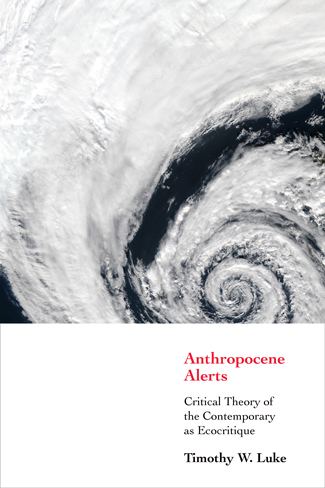 From the late 1970s, Timothy W. Luke has developed critical analyses of significant social, political, and cultural conflicts, with a particular focus on the entangled politics of culture, economy, and nature. Luke’s “ecocritiques,” many of which first appeared in the pages of Telos, advance a critical theory of the contemporary that takes aim at our ongoing ecological crisis, a period marked by rapid climate change, extensive biodiversity loss, and deep ecospheric damage. The essays collected here range across diverse topics, from the politics of the Anthropocene, Paolo Soleri’s urban design experiments, the Unabomber manifesto, the Trump administration’s attacks on environmental protections, and the informationalization of ecological change, to community agriculture projects, deep ecology, the symbolic politics of climate change treaties, Edward Abbey’s ecological writings, and the biopolitics of accelerationism and the Dark Enlightenment. Taken together, this collection documents crucial moments in Luke’s project of ecocritique as well as the commitment of Telos to environmental criticism, political theory, and policy analysis. From the late 1970s, Timothy W. Luke has developed critical analyses of significant social, political, and cultural conflicts, with a particular focus on the entangled politics of culture, economy, and nature. Luke’s “ecocritiques,” many of which first appeared in the pages of Telos, advance a critical theory of the contemporary that takes aim at our ongoing ecological crisis, a period marked by rapid climate change, extensive biodiversity loss, and deep ecospheric damage. The essays collected here range across diverse topics, from the politics of the Anthropocene, Paolo Soleri’s urban design experiments, the Unabomber manifesto, the Trump administration’s attacks on environmental protections, and the informationalization of ecological change, to community agriculture projects, deep ecology, the symbolic politics of climate change treaties, Edward Abbey’s ecological writings, and the biopolitics of accelerationism and the Dark Enlightenment. Taken together, this collection documents crucial moments in Luke’s project of ecocritique as well as the commitment of Telos to environmental criticism, political theory, and policy analysis.
Continue reading →
By David Pan · Monday, September 9, 2019 Telos 188 (Fall 2019): Theology and World Order is now available for purchase in our store. Individual subscriptions to Telos are also available in both print and online formats.
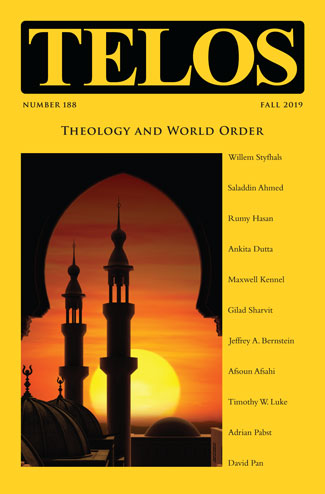 It would be naive to consider the question of global political order without engaging in debates about theology. Not only has it become clear that religious conflicts drive political ones, the very attempt to move “beyond” religion must be understood in terms of its theological meaning. The postsecular turn has not meant a return to religion so much as a realization that secularization was never a turn away from religion in the first place but rather itself a specific theological alternative among many. Accordingly, if our deepest political conflicts arise as consequences of theological disputes, we must address theology directly in order to get to the roots of major conflicts. Not only clear cases, such as conflicts between Israelis and Palestinians or between Shiite and Sunni Muslims, but also those between the United States and China revolve around theological issues that shape political and military conflict. Yet, our current approaches rely on political scientific and military calculations that have not yet been able to evaluate theology as a key and deciding factor in such conflicts. As the U.S. military and intelligence agencies debate the threat that Islamic State poses in Afghanistan, for instance, a key consideration should be the character and prospects of Islamic State’s theology, as well as the broader question of the role of theology in deciding political conflict. This issue of Telos engages in this discussion by considering how conceptions of world order arise from specific theologies. It would be naive to consider the question of global political order without engaging in debates about theology. Not only has it become clear that religious conflicts drive political ones, the very attempt to move “beyond” religion must be understood in terms of its theological meaning. The postsecular turn has not meant a return to religion so much as a realization that secularization was never a turn away from religion in the first place but rather itself a specific theological alternative among many. Accordingly, if our deepest political conflicts arise as consequences of theological disputes, we must address theology directly in order to get to the roots of major conflicts. Not only clear cases, such as conflicts between Israelis and Palestinians or between Shiite and Sunni Muslims, but also those between the United States and China revolve around theological issues that shape political and military conflict. Yet, our current approaches rely on political scientific and military calculations that have not yet been able to evaluate theology as a key and deciding factor in such conflicts. As the U.S. military and intelligence agencies debate the threat that Islamic State poses in Afghanistan, for instance, a key consideration should be the character and prospects of Islamic State’s theology, as well as the broader question of the role of theology in deciding political conflict. This issue of Telos engages in this discussion by considering how conceptions of world order arise from specific theologies.
Continue reading →
By J. E. Elliott · Thursday, August 1, 2019 J. E. Elliott’s “Insourcing Dissent: Brand English in the Entrepreneurial University” appears in Telos 187 (Summer 2019). Read the full article at the Telos Online website, or purchase a print copy of the issue in our online store. Individual subscriptions to Telos are available in both print and online formats.
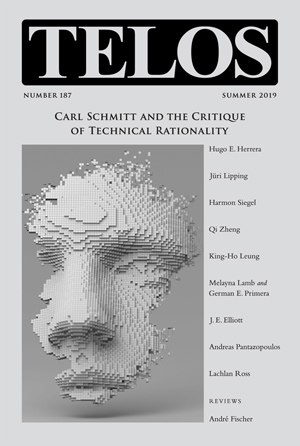 This essay addresses the emergence of dissent culture as a hallmark of teaching and research in English studies and the humanities more generally in the time and temper of the commercial-bureaucratic university. I argue that the most convincing explanation for the widespread adoption of a protest ethos in an institution ostensibly opposed to its prescriptions is not a paradigm shift from formalist to political approaches to texts and artifacts, much less principled opposition to late Western capitalism or technological reason, but a reproduction of the routines, scripts, norms, and values of American higher education as an entrepreneurial enterprise. Dissent, in other words, is an organizationally conservative force: it animates disciplinary alternatives to STEM and business curricula while articulating a remedial narrative of inclusiveness (“diversity”) that bears witness to American higher education’s residual commitments to political engagement and democracy building. This insourcing of protest has assured English studies’ viability in the corporate university by reconfiguring the discipline as an academic brand alongside Brand Science and Brand Business in the organizational field of the university. To the extent that the politics of advocating for the disempowered and marginalized is an in-house creation without demonstrable political or policy-related impact, however, dissent culture can also be read as a reflexive (and symptomatic) protest against its own institutional capture. The essay concludes with a discussion of prospective alterations to Brand English in light of recent developments in the digital humanities. This essay addresses the emergence of dissent culture as a hallmark of teaching and research in English studies and the humanities more generally in the time and temper of the commercial-bureaucratic university. I argue that the most convincing explanation for the widespread adoption of a protest ethos in an institution ostensibly opposed to its prescriptions is not a paradigm shift from formalist to political approaches to texts and artifacts, much less principled opposition to late Western capitalism or technological reason, but a reproduction of the routines, scripts, norms, and values of American higher education as an entrepreneurial enterprise. Dissent, in other words, is an organizationally conservative force: it animates disciplinary alternatives to STEM and business curricula while articulating a remedial narrative of inclusiveness (“diversity”) that bears witness to American higher education’s residual commitments to political engagement and democracy building. This insourcing of protest has assured English studies’ viability in the corporate university by reconfiguring the discipline as an academic brand alongside Brand Science and Brand Business in the organizational field of the university. To the extent that the politics of advocating for the disempowered and marginalized is an in-house creation without demonstrable political or policy-related impact, however, dissent culture can also be read as a reflexive (and symptomatic) protest against its own institutional capture. The essay concludes with a discussion of prospective alterations to Brand English in light of recent developments in the digital humanities.
Continue reading →
By Qi Zheng · Wednesday, July 24, 2019 Qi Zheng’s “Carl Schmitt, Justice of War, and Individual Citizen’s Obligation” appears in Telos 187 (Summer 2019). Read the full article at the Telos Online website, or purchase a print copy of the issue in our online store. Individual subscriptions to Telos are available in both print and online formats.
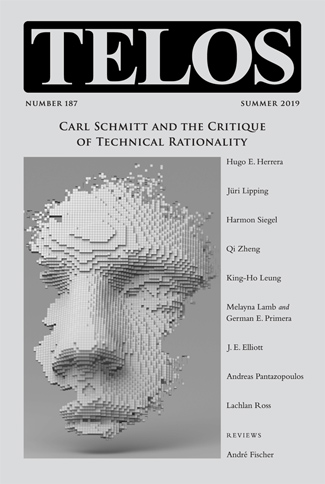 Carl Schmitt produced the original text of “The International Crime of the War of Aggression and the Principle ‘Nullum crimen, nulla poena sine lege‘” in 1945. The fundamental issue of the text concerns an individual citizen’s obligation in international law toward his national government in the event of an unjust war. Schmitt’s analysis of the issue is based on his perception of politics as the relationship between protection and obedience. However, his understanding of this relationship is not consistent with what he proposed in his other major works, i.e., that the relationship is a collective one. In order to support the argument in his 1945 text, Schmitt completely abandoned his collective understanding of the relationship and changed it to an individualistic understanding. This paper explores the subtle but important change in Schmitt’s argument. Carl Schmitt produced the original text of “The International Crime of the War of Aggression and the Principle ‘Nullum crimen, nulla poena sine lege‘” in 1945. The fundamental issue of the text concerns an individual citizen’s obligation in international law toward his national government in the event of an unjust war. Schmitt’s analysis of the issue is based on his perception of politics as the relationship between protection and obedience. However, his understanding of this relationship is not consistent with what he proposed in his other major works, i.e., that the relationship is a collective one. In order to support the argument in his 1945 text, Schmitt completely abandoned his collective understanding of the relationship and changed it to an individualistic understanding. This paper explores the subtle but important change in Schmitt’s argument.
This paper is divided into two sections. The first section reconstructs Schmitt’s arguments on an individual citizen’s right to resistance in international law. It focuses on two questions: whether an individual citizen has the right to judge the justice of war and whether individuals have an obligation in international law to disobey the government if they find that their government is conducting an unjust war. The second section examines Schmitt’s argument about the relationship between protection and obedience.
Continue reading →
By Erik Olin Wright · Thursday, May 9, 2019 Erik Olin Wright’s “Martin Sklar’s Theory of Capitalism and Socialism” appears in Telos 186 (Spring 2019). Read the full article at the Telos Online website, or purchase a print copy of the issue in our online store. Individual subscriptions to Telos are available in both print and online formats.
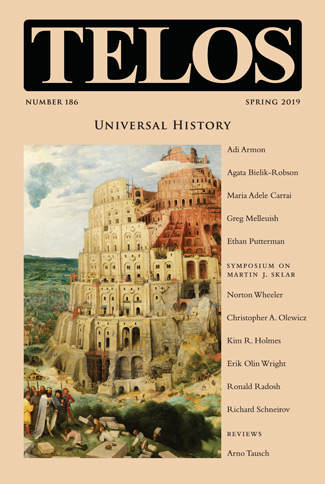 This essay explores how Martin Sklar’s typology of the patterns of thought that have animated social and political struggles in capitalist societies since the mid-nineteenth century can, with some modification, be incorporated into a more general analytical framework for thinking about alternatives to capitalism. Sklar frames his analysis primarily in terms of two contrasts—between what he calls “utopian” and “realist” modes of thoughts, and between capitalism and socialism as ways of organizing political-economy institutions. He supports a realist mode of thought that examines the ways in which socialist elements emerge within capitalism, creating various kinds of hybrids through what he calls the “capitalism/socialism interplay.” The prospects for progressive social change come out of that interplay. This essay proposes modifying Sklar’s framework in two respects: First, rather than rejecting the utopian mode of thought, utopian models can be useful as a way of clarifying the normative foundations of struggles for human emancipation and the logical connections between different elements of proposed alternatives to existing institutions and social structures. Second, while Sklar is correct that real economic systems contain hybrids of capitalist and noncapitalist elements, it is a mistake to lump all relevant noncapitalist elements under the rubric “socialist.” Specifically, it is useful to distinguish statism from socialism. This creates a more nuanced conceptual map of possibilities and points more clearly to the problem of democratizing state and democratizing the economy as the central task of progressive politics. This essay explores how Martin Sklar’s typology of the patterns of thought that have animated social and political struggles in capitalist societies since the mid-nineteenth century can, with some modification, be incorporated into a more general analytical framework for thinking about alternatives to capitalism. Sklar frames his analysis primarily in terms of two contrasts—between what he calls “utopian” and “realist” modes of thoughts, and between capitalism and socialism as ways of organizing political-economy institutions. He supports a realist mode of thought that examines the ways in which socialist elements emerge within capitalism, creating various kinds of hybrids through what he calls the “capitalism/socialism interplay.” The prospects for progressive social change come out of that interplay. This essay proposes modifying Sklar’s framework in two respects: First, rather than rejecting the utopian mode of thought, utopian models can be useful as a way of clarifying the normative foundations of struggles for human emancipation and the logical connections between different elements of proposed alternatives to existing institutions and social structures. Second, while Sklar is correct that real economic systems contain hybrids of capitalist and noncapitalist elements, it is a mistake to lump all relevant noncapitalist elements under the rubric “socialist.” Specifically, it is useful to distinguish statism from socialism. This creates a more nuanced conceptual map of possibilities and points more clearly to the problem of democratizing state and democratizing the economy as the central task of progressive politics.
Continue reading →
By Mitchell Dean · Friday, February 8, 2019 Mitchell Dean’s “Oath and Office” appears in Telos 185 (Winter 2018). Read the full article at the Telos Online website, or purchase a print copy of the issue in our online store. Individual subscriptions to Telos are available in both print and online formats.
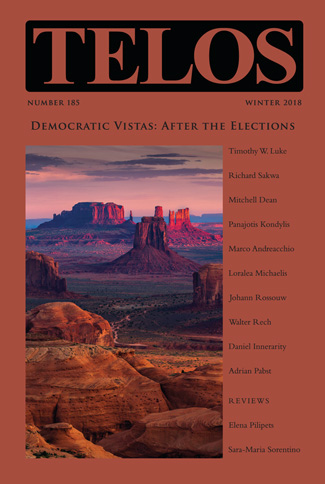 The oath pertains to law, sovereignty, and office. A public servant takes an oath. A witness and a juror at a trial swear an oath. The British monarch swears a coronation oath and the president-elect of the United States an oath of office. While the coronation of the monarch has been regarded as “medieval” and the inauguration of the president as “ceremonial” or “symbolic,” it would be a mistake to view them as empty rituals, particularly the oaths taken. And while the oath invokes God, it would be an error to assume that it is merely an atavism, a retroversion, or a vestige of a more religious past. But what it is and what it does is far from clear, including to those who swear oaths. When President Obama, sworn in by Chief Justice John Roberts, misspoke his oath of office in January 2009, he was advised to retake it the next day, as the White House counsel put it, “out of an abundance of caution.” Ex abundanti cautela might indeed by the principle that scholars should adopt, given the thicket of false trails, unfathomable origins, prejudices, and commonplaces that afflict any attempt to study this practice. The appropriate method to study the oath uses multiple examples and cases, considers them from as many different viewpoints as it can, and remains wary of both our commonsense assumptions about its origins and efficacy and their theoretical correlates. The oath pertains to law, sovereignty, and office. A public servant takes an oath. A witness and a juror at a trial swear an oath. The British monarch swears a coronation oath and the president-elect of the United States an oath of office. While the coronation of the monarch has been regarded as “medieval” and the inauguration of the president as “ceremonial” or “symbolic,” it would be a mistake to view them as empty rituals, particularly the oaths taken. And while the oath invokes God, it would be an error to assume that it is merely an atavism, a retroversion, or a vestige of a more religious past. But what it is and what it does is far from clear, including to those who swear oaths. When President Obama, sworn in by Chief Justice John Roberts, misspoke his oath of office in January 2009, he was advised to retake it the next day, as the White House counsel put it, “out of an abundance of caution.” Ex abundanti cautela might indeed by the principle that scholars should adopt, given the thicket of false trails, unfathomable origins, prejudices, and commonplaces that afflict any attempt to study this practice. The appropriate method to study the oath uses multiple examples and cases, considers them from as many different viewpoints as it can, and remains wary of both our commonsense assumptions about its origins and efficacy and their theoretical correlates.
Continue reading →
|
|
 From the late 1970s, Timothy W. Luke has developed critical analyses of significant social, political, and cultural conflicts, with a particular focus on the entangled politics of culture, economy, and nature. Luke’s “ecocritiques,” many of which first appeared in the pages of Telos, advance a critical theory of the contemporary that takes aim at our ongoing ecological crisis, a period marked by rapid climate change, extensive biodiversity loss, and deep ecospheric damage. The essays collected here range across diverse topics, from the politics of the Anthropocene, Paolo Soleri’s urban design experiments, the Unabomber manifesto, the Trump administration’s attacks on environmental protections, and the informationalization of ecological change, to community agriculture projects, deep ecology, the symbolic politics of climate change treaties, Edward Abbey’s ecological writings, and the biopolitics of accelerationism and the Dark Enlightenment. Taken together, this collection documents crucial moments in Luke’s project of ecocritique as well as the commitment of Telos to environmental criticism, political theory, and policy analysis.
From the late 1970s, Timothy W. Luke has developed critical analyses of significant social, political, and cultural conflicts, with a particular focus on the entangled politics of culture, economy, and nature. Luke’s “ecocritiques,” many of which first appeared in the pages of Telos, advance a critical theory of the contemporary that takes aim at our ongoing ecological crisis, a period marked by rapid climate change, extensive biodiversity loss, and deep ecospheric damage. The essays collected here range across diverse topics, from the politics of the Anthropocene, Paolo Soleri’s urban design experiments, the Unabomber manifesto, the Trump administration’s attacks on environmental protections, and the informationalization of ecological change, to community agriculture projects, deep ecology, the symbolic politics of climate change treaties, Edward Abbey’s ecological writings, and the biopolitics of accelerationism and the Dark Enlightenment. Taken together, this collection documents crucial moments in Luke’s project of ecocritique as well as the commitment of Telos to environmental criticism, political theory, and policy analysis. 






